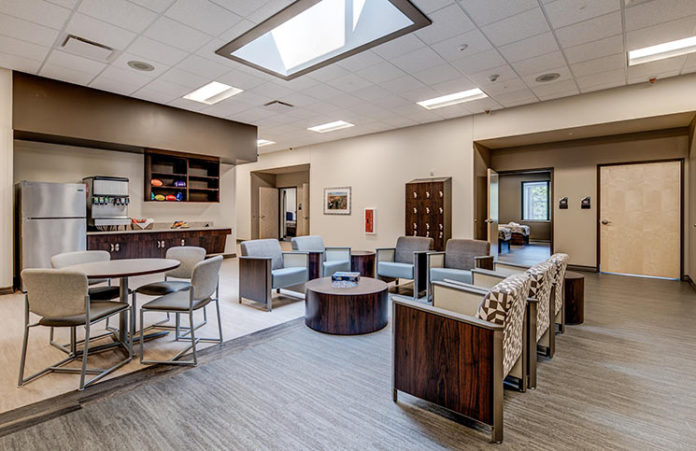
Rainier Springs, a new comprehensive behavioral health facility bordering Salmon Creek in the Vancouver area, opened and began accepting patients on Oct. 3. The facility delivers adult inpatient/outpatient mental health and substance abuse treatment to Vancouver and the surrounding region.
“Springstone, Inc. (the company that Rainier Springs is a part of) does a good job of finding where there is a need,” said Gary Petersen, Rainier Springs CEO. “We looked at patients here, referrals, the number of beds in the state of Washington. If you talk to anyone in the state, there is a definite shortage of behavioral health beds in the state of Washington. And in this particular area, there’s really nothing like this (Rainier Springs). This particular model doesn’t really exist in Vancouver.”
Petersen said that Rainier Springs takes on detox patients, as well as mental wellness patients. Mental wellness includes issues like depression, PTSD, suicidal ideation, anxiety disorder, etc. By possibly early 2019, Petersen said they hope to have a Help for Heroes program, which will be a specialized program for active duty military personnel and first responders.
In a recent news release about the opening of Rainier Springs, Petersen said that their treatment model is focused on mutual respect, safety and quality of care.
“We are creating pathways of care that are data-driven and based on best practices,” Petersen said. “Addiction and mental health are major issues in this community. Rainier Springs wants to be part of the solution, and we are eager to provide the help that our region so deserves.”
“Our focus is really on outcome,” said Larisa Klein, COO and director of business development. “We are doing performance improvement continually from the facility. We’re able to measure if a patient is doing better. All care is evidence based, it’s all really data driven and we’re able to continue to bring a high level of quality.”
According to recent data cited in the Rainer Springs opening news release, 1,131 Washingtonians died by suicide in 2016, an increase of as much as 25 percent over the previous year. Washington currently ranks 49th in the U.S. for the number of inpatient psychiatric beds – eight – available per 100,000 residents. About one in four Washington residents met criteria for a mental health disorder such as schizophrenia, bipolar disorder and depression.
The model of care at Rainier Springs focuses on:
- Emergency Room utilization avoidance
- Every day, round-the-clock access to care
- Decreasing readmissions and more advanced utilization management
- Opioid addiction (and all other addictive medications) coverage
- Enhanced outpatient medication management
- Tele-health services and consultations for rural and underserved areas
- Continuum of care delivery for value-based behavioral health services
Intake, assessments and telephone triage are available 24 hours per day, 365 days per year. Patients are also able to do self-assessments and are able to simply walk in to the facility to do so, or they offer scheduled assessments as well.
“Our model is accepting of all payers,” Klein said. “Many programs in the area are really built around the payers, but we accept all payers. We accept all private insurances, Medicare, Medicaid and TRICARE, etc. It’s an important message to send to the community. Anyone can come in for an assessment, and if they meet the medical necessity, either for mental health or addiction, we’re offering that treatment to them. We want to be a choice-based hospital for the community.”
A major aspect of Rainier Springs that Petersen said he feels really sets the facility apart is the environment at the facility. He said the building was designed and constructed in a way that aims to create a calm environment; there is lots of natural light let in by skylights and every patient room has a window with an outdoor view. There’s outdoor space that patients can enjoy, as well as an indoor exercise facility.
Petersen said the programming at Rainier Springs is also a bit more “robust,” and includes group therapy sessions, yoga therapy, art therapy, music therapy and pet therapy. Rainier Springs also uses a program that involves patients in group rooms being provided with a laptop and a login number, and are able to create their own avatar and use it for things like daily journaling, identifying different safety plans and more. After they leave the facility, they are able to maintain that login for home use, enabling them continued access.
Rainier Springs started accepting patients on Oct. 3, and Petersen said, so far, they have about 16 patients. He said they currently have one of three units open; when they open all three they will have the potential to have 72 beds/patients. Currently, the facility has approximately 80 staff members, which Petersen said will increase to close to 350 when all of the units are open. Those staff positions range from physicians to licensed therapists and nurses to counselors and a full range of support team members.
The new Rainier Springs facility is located at 2805 NE 129th St., Vancouver.





